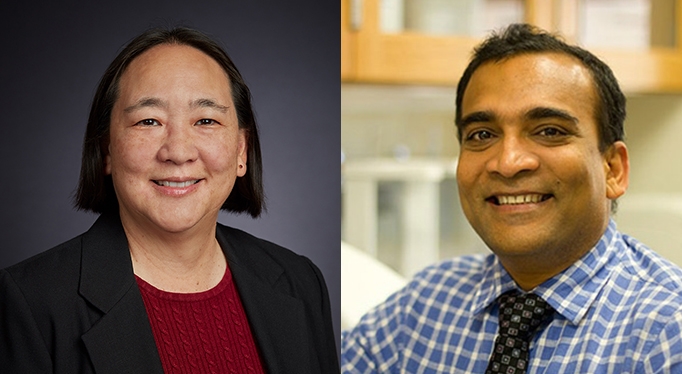Two researchers from the University of Oklahoma have been named Fellows of the American Association for the Advancement of Science, the world’s largest multidisciplinary scientific society.
Ann West, Ph.D. and Priyabrata Mukherjee, Ph.D. are among 564 scientists, engineers and innovators spanning 24 scientific disciplines being recognized for their scientifically and socially distinguished achievements. They are the only recipients from Oklahoma this year.
“Dr. West and Dr. Mukherjee’s election as Fellows of AAAS is a testament to the significance and impact their research has had in their respective fields,” said Tomás Díaz de la Rubia, vice president for research and partnerships at OU Norman. “With their help, and the help of many other researchers at the University of Oklahoma, we will continue to unlock our greatest potential as one of the nation’s top public research institutions.”
West is the Grayce B. Kerr Centennial Chair in the Department of Chemistry and Biochemistry and the director of the National Institutes of Health-funded Center of Biomedical Research Excellence in Structural Biology. She joined the Office of the Vice President for Research and Partnerships as a faculty fellow in 2018 before being named associate vice president in 2019.
Focused on microbial signal transduction and adaptive stress responses, West uses molecular biology and X-ray crystallography to determine structures of biomedically important proteins through her work on microbes and pathogenic bacteria.
She has been the recipient of numerous research awards, including the Joseph A. Brandt Professorship, Edith Kinney Gaylord Presidential Professorship, Irene Rothbaum Award for Outstanding Assistant Professor and a Cottrell Scholar Award from Research Corporation for Science Advancement. In addition to her service roles at the departmental, college and university level, she has served on many National Science Foundation and NIH grant review panels and executive advisory committees.
West earned a bachelor of arts in biology from Wesleyan University and a doctoral degree in genetics from Yale University.
Mukherjee is a tenured professor of pathology at the OU College of Medicine. He holds the Presbyterian Health Foundation Presidential Professorship and is the Peggy and Charles Stephenson Endowed Chair in Laboratory Cancer Research at OU Health Stephenson Cancer Center, the only National Cancer Institute designated cancer center in the state. He also serves as the associate director for translational research and co-director of the Nanomedicine Program at the cancer center.
Mukherjee’s research is centered at the interface between biology and materials science to address unmet challenges in human diseases. His laboratory is mostly funded by the investigator-initiated research project grants from the National Institutes of Health. He currently has several multimillion-dollar R01 grants from the National Cancer Institute, which provide support for health-related research and development based on the mission of the NIH.
His research has garnered numerous awards, including the Outstanding Achievement Award from the Society of Asian American Scientists in Cancer Research and the Fred G. Silva Award from the OU Department of Pathology. He is also a Tobacco Settlement Endowment Trust Research Scholar and an elected fellow of the Royal Society of Chemistry, American Institute of Medical and Biological Engineering and the National Academy of Inventors.
Mukherjee earned a bachelor of science and a master of science in chemistry from the University of Burdwan and a doctoral degree from the University of Poona.
AAAS has individual members in more than 91 countries around the globe. AAAS members can be considered for the rank of Fellow if nominated by the steering group of their respective sections, by three Fellows or by the association’s chief executive office. Each steering group then reviews the nominations of individuals within the section and forwards a final list to the AAAS Council.
New Fellows will receive an official certificate and a gold and blue rosette pin to commemorate their selection and will also be featured in the January 2022 issue of Science.


